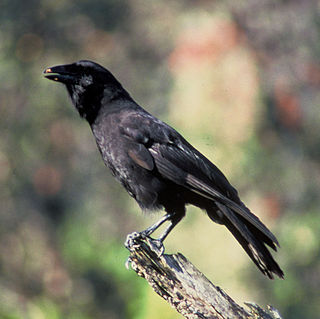Paralysis is a loss of motor function in one or more muscles. Paralysis can also be accompanied by a loss of feeling in the affected area if there is sensory damage. In the United States, roughly 1 in 50 people have been diagnosed with some form of permanent or transient paralysis. The word "paralysis" derives from the Greek παράλυσις, meaning "disabling of the nerves" from παρά (para) meaning "beside, by" and λύσις (lysis) meaning "making loose". A paralysis accompanied by involuntary tremors is usually called "palsy".

Herring are various species of forage fish, belonging to the order Clupeiformes.

Spina bifida is a birth defect in which there is incomplete closing of the spine and the membranes around the spinal cord during early development in pregnancy. There are three main types: spina bifida occulta, meningocele and myelomeningocele. Meningocele and myelomeningocele may be grouped as spina bifida cystica. The most common location is the lower back, but in rare cases it may be in the middle back or neck.

The bare-backed rousette is a species of megabat.

Nepenthes ramispina is a highland Nepenthes pitcher plant species, native to Peninsular Malaysia. It was once regarded as being similar to N. gracillima, but studies of the two species in nature have shown that they are readily distinguishable in isolation, N. gracillima being far more readily confused with N. macfarlanei in its rosette stage.

A species that is extinct in the wild (EW) is one that has been categorized by the International Union for Conservation of Nature as only consisting of living members kept in captivity or as a naturalized population outside its historic range. Classification requires exhaustive surveys conducted within the species' known habitat with consideration given to seasonality, time of day, and life cycle. Once a species is classified as EW, the only way for it to be downgraded is through reintroduction.
The Daghestan pine vole is a species of rodent in the family Cricetidae. It is found in Russia, Georgia, Armenia, and Azerbaijan.

Amolops spinapectoralis is a species of frog in the family Ranidae, the "true frogs". It is at present only known from a few locations in central Vietnam—that is, it is endemic to Vietnam—but it is likely to be found more widely in the Vietnamese Central Highlands as well as in the adjacent southeastern Laos and northeastern Cambodia. The specific name spinapectoralis is derived from Latin spina for "thorn" and pectoralis for "of the breast" and refers to the pectoral spines in adult males. Common name spinyback torrent frog has been coined for it.

The mourning sierra finch is a species of South American bird in the tanager family Thraupidae.
Macroperipatus insularis is a species of velvet worm in the Peripatidae family. It is found in Jamaica, and Hispaniola. The original description of this species is based on a female specimen, 55 mm long, with 30 pairs of legs.
Mesoperipatus is a monospecific genus of velvet worm in the Peripatidae family, containing a single species Mesoperipatus tholloni. It is found in Gabon, making it the only known species of velvet worm in the tropics of Africa, and the only known species of peripatid velvet worm in Africa. Females of this species have 24 to 27 pairs of legs; males have 23 or 24. This species is viviparous, but too little is known of its embryology to describe its reproductive mode in any more detail; the presence of a placenta, for example, has not been confirmed.
Speleoperipatus is a monospecific genus of velvet worm in the Peripatidae family, containing the single species Speleoperipatus spelaeus. This species is a pale greenish yellow, almost white, with 22 or 23 pairs of legs and no eyes. Specimens range from 27 mm to 34 mm in length. The minimum number of leg pairs found in this species (22) is also the minimum number found in the neotropical Peripatidae. This velvet worm is viviparous, with mothers supplying nourishment to their embryos through a placenta.

Stygobromus is a genus of amphipod crustaceans that live in subterranean habitats. The majority of the listed species are endemic to North America, a smaller number of species are also known from Eurasia. Most of the North American species live in areas which were not covered by the Laurentide Ice Sheet, although a few species seem to have survived under the ice. A number of species are on the IUCN Red List as endangered species (EN) or vulnerable species (VU); one species, S. lucifugus, is extinct.

A vulnerable species is a species which has been categorized by the International Union for Conservation of Nature as being threatened with extinction unless the circumstances that are threatening its survival and reproduction improve.

Ziziphus spina-christi, known as the Christ's thorn jujube, is an evergreen tree or plant native to the Levant, East Africa, and Mesopotamia. Fruit and leaves from the tree were used in preparing ancient Egyptian foods, in cultural practices, and in skincare routines - especially with qasil powder derived from the Ziziphus spina-christi tree leaves.

Endangered species, as classified by the International Union for Conservation of Nature (IUCN), are species which have been categorized as very likely to become extinct in their known native ranges in the near future. On the IUCN Red List, endangered is the second-most severe conservation status for wild populations in the IUCN's schema after critically endangered. In 2012, the IUCN Red List featured 3,079 animal and 2,655 plant species as endangered worldwide. The figures for 1998 were 1,102 and 1,197 respectively.











